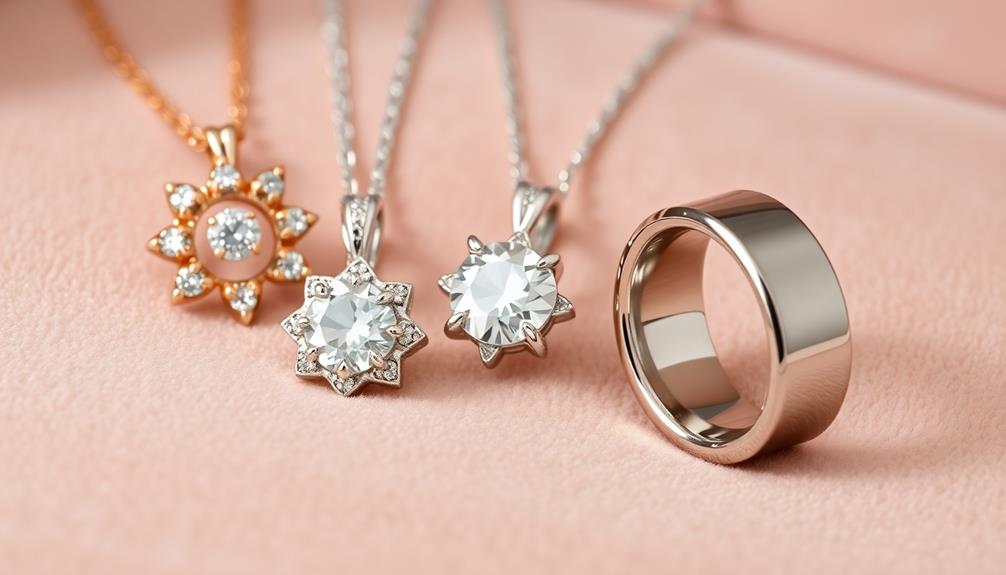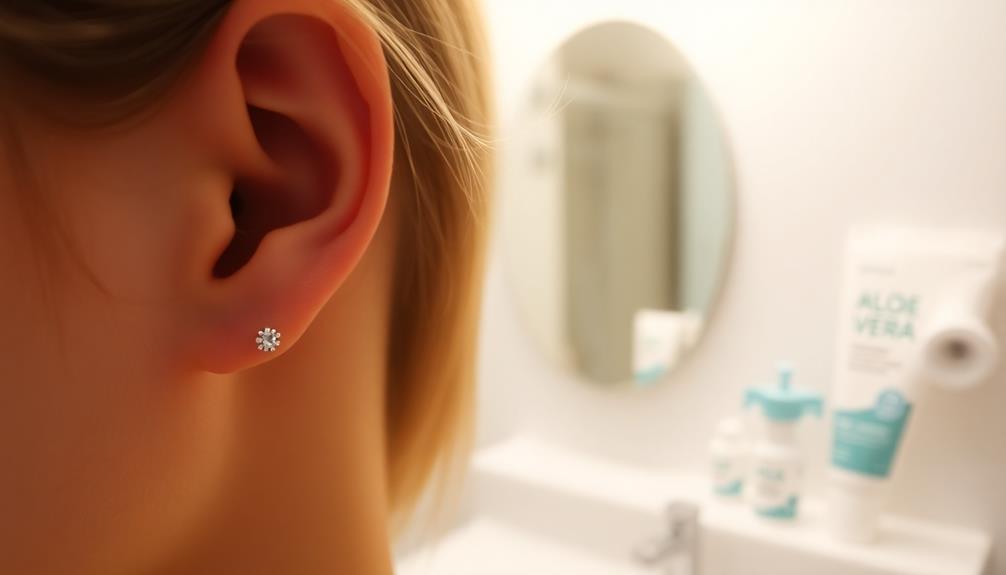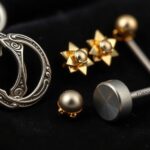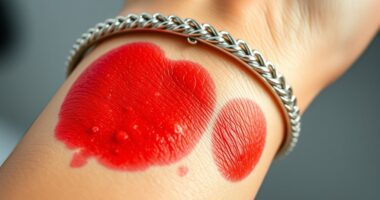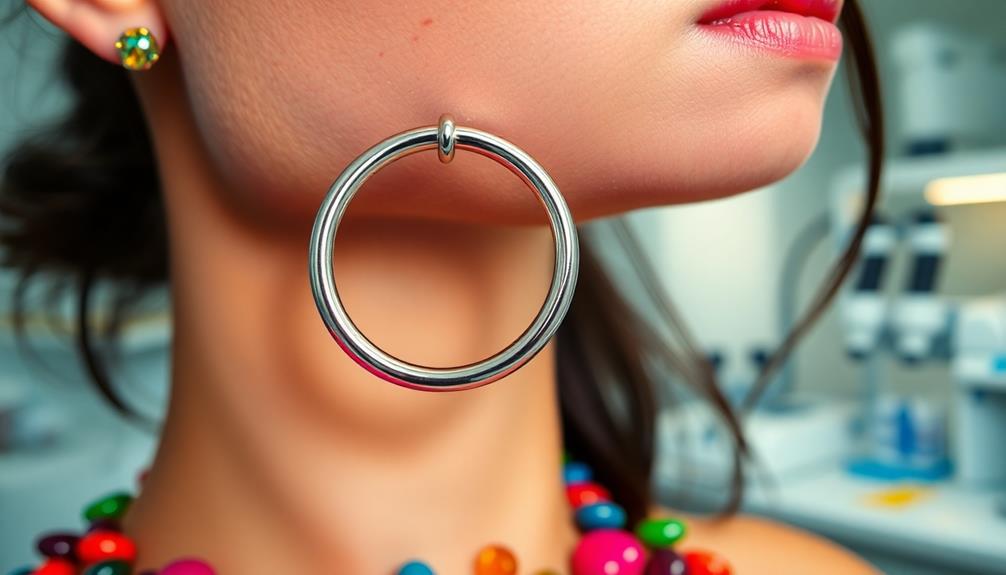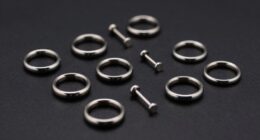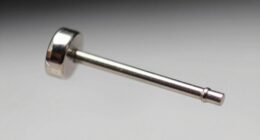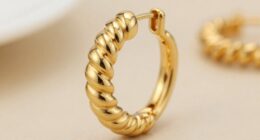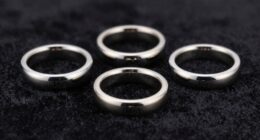If you have sensitive skin, hypoallergenic jewelry can be a game changer. Look for pieces made from materials like surgical stainless steel, titanium, niobium, or 24k gold to minimize irritation. These materials are designed to reduce allergic reactions, so you can wear your jewelry comfortably. Avoid items that contain nickel or brass, and always check product labels for "nickel-free" claims. Regular cleaning can also help prevent skin issues. By choosing the right materials, you can enjoy stylish options that won't cause irritation. There's plenty more to discover about finding the perfect jewelry for your needs.
Key Takeaways
- Look for materials like titanium, surgical stainless steel, niobium, and platinum, which are known for their hypoallergenic properties.
- Choose jewelry labeled as "nickel-free" to minimize the risk of allergic reactions.
- Opt for 14k or higher gold, as lower karats may contain nickel that can irritate sensitive skin.
- Regularly clean hypoallergenic jewelry to remove dirt and allergens, promoting skin health and comfort.
- Consult a dermatologist for personalized advice on selecting safe jewelry materials for sensitive skin.
Definition of Hypoallergenic Jewelry
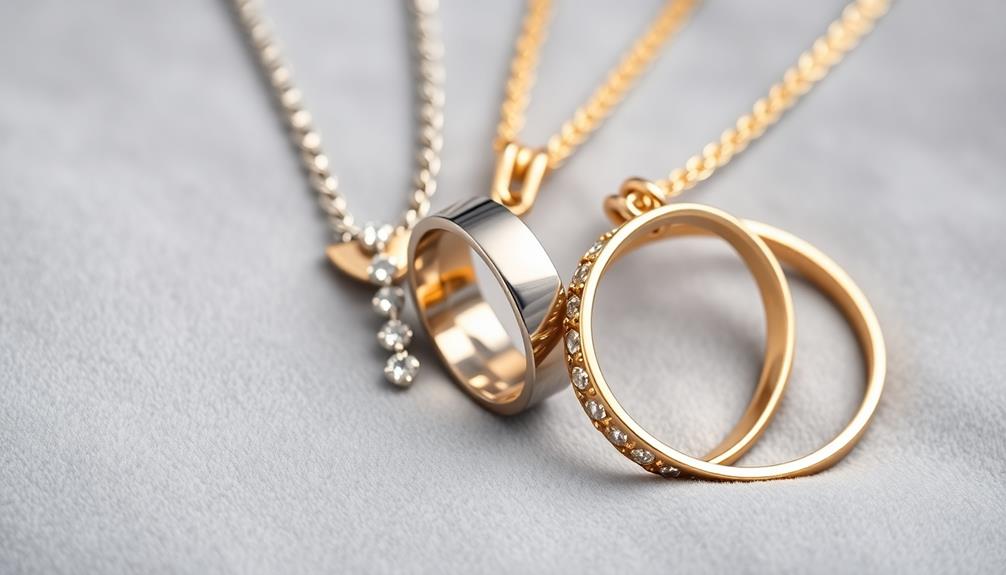
Hypoallergenic jewelry refers to items crafted from materials that are less likely to trigger allergic reactions in sensitive individuals. If you have sensitive skin, you know how frustrating it can be to wear jewelry that irritates you.
Hypoallergenic options are designed to minimize this discomfort by using metals with low or no nickel content, a common allergen that affects about 15% of the population.
While many jewelry pieces are labeled as hypoallergenic, keep in mind that there are no standardized criteria for this term. Consequently, it's crucial to verify the metal content before making a purchase.
Common metals used in hypoallergenic jewelry include titanium, surgical stainless steel, and high-karat gold (14k or higher), all known for their low reactivity.
These materials are specially chosen to provide a comfortable wearing experience, reducing the risk of symptoms like redness, itching, or swelling.
Always check for any potential trace amounts of nickel, even in "nickel-free" options, to confirm you're making the right choice for your sensitive skin.
With the right hypoallergenic jewelry, you can enjoy beautiful pieces without compromising your comfort.
Common Metals Used

When exploring hypoallergenic jewelry options, understanding the common metals used can help you make informed choices. Here's a handy table outlining some popular hypoallergenic metals and their properties:
| Metal | Key Features |
|---|---|
| Titanium | Highly biocompatible, strong, lightweight, and corrosion-resistant. |
| Surgical Stainless Steel | Low nickel content, durable, and tarnish-resistant. |
| Niobium | Rare and biocompatible, available in various colors. |
| Platinum | Naturally hypoallergenic, dense, and durable. |
| Gold | 14k or higher is less reactive; pure 24k is recommended for sensitivities. |
If you have sensitive skin or have experienced allergies to jewelry, these metals offer great options. Titanium is a favorite for its strength and lightweight feel, while surgical stainless steel minimizes nickel exposure. Niobium is perfect for body jewelry, thanks to its hypoallergenic nature. Platinum stands out for fine jewelry pieces, reducing the chances of skin irritations. Finally, while gold can be a good choice, it's essential to opt for higher purity to avoid reactions.
Benefits of Hypoallergenic Options

When you choose hypoallergenic jewelry, you're opting for reduced skin irritation and long-term comfort.
These pieces are crafted from materials designed to minimize allergic reactions, so you can wear them without worry.
Plus, their durability means you won't have to sacrifice style for safety.
Reduced Skin Irritation
Wearing jewelry shouldn't mean dealing with discomfort, and choosing hypoallergenic options can greatly reduce the risk of skin irritation. Hypoallergenic jewelry is crafted from materials with low or no nickel content, which is a common allergen affecting around 15% of people. By opting for metals like titanium, surgical stainless steel, and platinum, you benefit from their biocompatibility, minimizing the chances of allergic reactions.
When you wear hypoallergenic jewelry, you're less likely to experience symptoms associated with metal allergies, such as redness, itching, and swelling. This not only enhances your comfort but also allows you to enjoy your accessories without worry.
Regular cleaning of your hypoallergenic pieces can further reduce irritation by removing dirt and allergens that might cause sensitivity.
Moreover, choosing hypoallergenic options supports your individual health needs while offering a variety of styles and finishes to match your aesthetic preferences. With hypoallergenic jewelry, you can indulge in beautiful pieces that feel good to wear, ensuring that your sensitive skin remains irritation-free and comfortable throughout the day.
Long-Term Comfort
Hypoallergenic jewelry offers lasting comfort for those with sensitive skin. By opting for hypoallergenic options, you greatly reduce the risk of allergic reactions and skin irritations.
Materials like titanium and surgical stainless steel aren't only durable but also resistant to tarnishing and corrosion, ensuring your jewelry remains comfortable even after extended wear. The low nickel content in these metals minimizes the likelihood of discomfort, allowing you to enjoy your favorite pieces without worry.
Maintaining your hypoallergenic jewelry is essential for long-term comfort; regular cleaning helps prevent allergens from accumulating on the metal surfaces. This simple practice supports your overall skin health, making it easier for you to wear accessories confidently.
With hypoallergenic options, you can indulge in beautiful jewelry without the fear of irritation that often accompanies traditional pieces.
Ultimately, choosing hypoallergenic jewelry means you're investing in your comfort and skin health. Enjoy the peace of mind that comes from knowing your accessories won't cause discomfort, letting you express your style effortlessly.
Embrace the long-term benefits of hypoallergenic jewelry, and feel good about what you wear.
Identifying Safe Jewelry
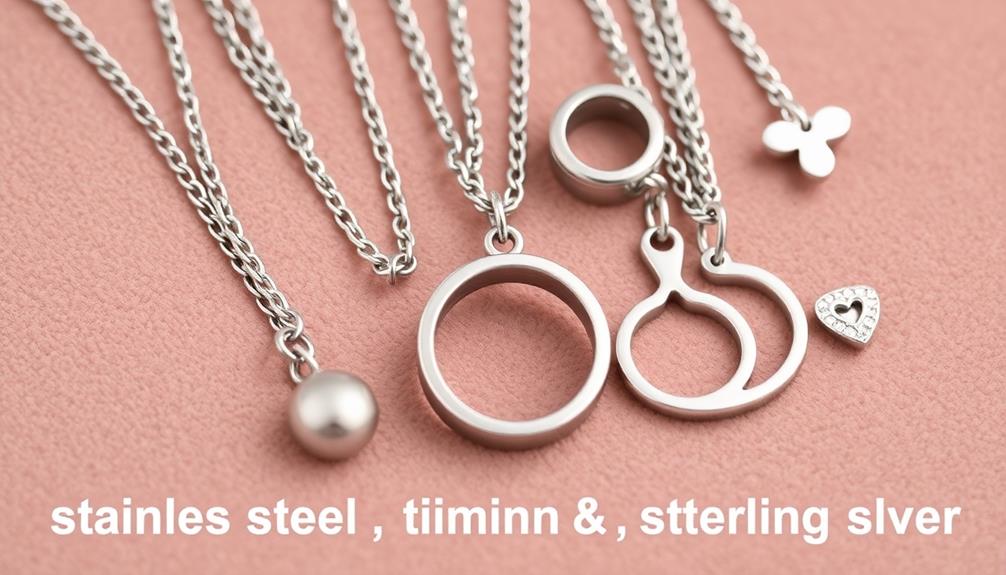
Choosing safe jewelry is essential for anyone prone to skin sensitivities. When you're shopping for hypoallergenic options, it's important to know which materials are less likely to trigger allergic reactions.
Here are four key factors to keep in mind:
- Nickel-Free: Look for jewelry labeled as "nickel-free." This is significant since nickel is a common allergen.
- Material Choices: Opt for surgical stainless steel, titanium, or niobium, known for their low allergenic properties, particularly for sensitive skin.
- Precious Metals: Pure gold (24k) and platinum are excellent choices. They're less likely to cause irritations compared to lower karat gold.
- Check Metal Content: Always verify certifications or metal content details. Some hypoallergenic items may still contain trace amounts of allergens.
Symptoms of Jewelry Allergies
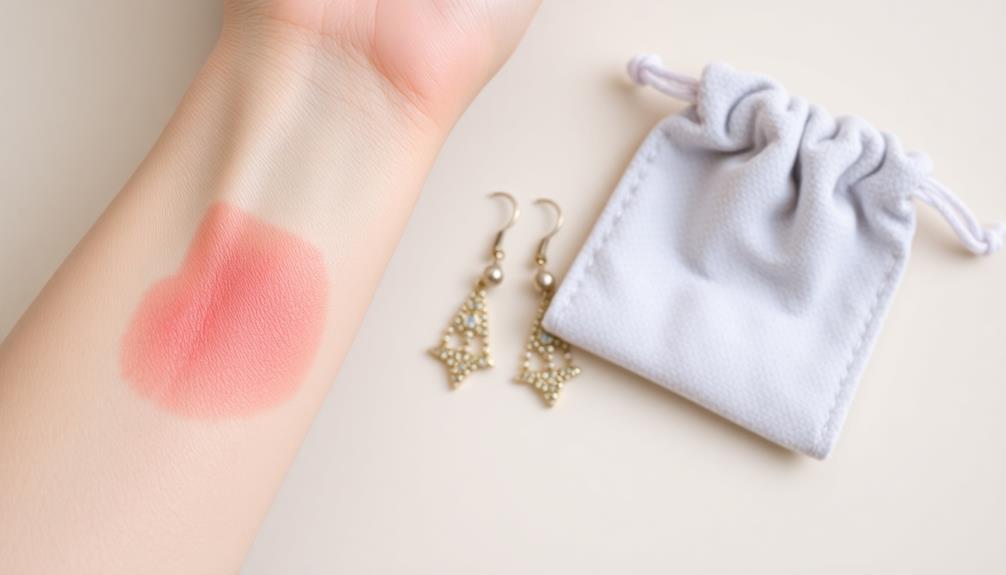
If you notice redness, itching, or swelling where your jewelry sits, you might be experiencing a jewelry allergy.
These reactions often stem from materials like nickel, which can cause dry patches or blisters with prolonged exposure.
Understanding these symptoms and identifying the problematic jewelry can help you avoid discomfort in the future.
Common Allergy Symptoms
Jewelry allergies can manifest in several uncomfortable ways, making it essential to recognize the symptoms early. If you have sensitive skin, staying alert to these signs can prevent further irritation and discomfort.
Here are some common allergy symptoms to watch for:
- Redness or Rash: Look for discoloration at contact points, often indicating an allergic reaction to metals like nickel.
- Itching: You might experience persistent itching, burning, or stinging sensations where jewelry touches your skin, signaling irritation or sensitivity.
- Inflammation: Swelling around the jewelry area is a frequent response, especially in those with metal sensitivity.
- Blisters or Hives: In more severe cases, prolonged exposure to allergens can lead to blisters or hives, indicating a serious allergic reaction.
These symptoms may worsen over time, leading to dry, scaly, or flaky skin if exposure continues.
Recognizing these signs early can help you make informed choices about your jewelry and protect your skin from further harm. If you suspect you have a nickel allergy or other jewelry allergies, consider opting for hypoallergenic options to avoid these reactions.
Causes of Reactions
What causes reactions to jewelry can often be traced back to specific materials that trigger your body's immune response. Many people with sensitive skin experience allergic reactions primarily due to nickel content found in various metals.
When you wear jewelry containing nickel or other allergenic metals, you might notice redness or a rash at the contact points. This irritation can lead to itching, burning, or stinging sensations around the area where the jewelry is worn.
If you continue to wear such items, you could develop swelling or inflammation, particularly with costume jewelry that often contains lower-quality metals. In severe cases, these jewelry allergies may result in blisters or hives, indicating that you need to remove the offending piece immediately.
Dry, scaly, or flaky skin can also develop in response to these allergens, which emphasizes the importance of opting for hypoallergenic jewelry options.
Choosing pieces made from pure metals, like surgical-grade stainless steel or titanium, can help minimize skin reactions and guarantee a more comfortable experience for those prone to metal sensitivity.
Identifying Problematic Jewelry
Experiencing discomfort after wearing a piece of jewelry can be a telltale sign of an allergic reaction. If you have sensitive skin, it's essential to recognize the symptoms of jewelry allergies early.
Common indicators include:
- Redness: A noticeable change in skin color around the jewelry.
- Rash: Small bumps or patches that appear soon after contact.
- Itching: An overwhelming urge to scratch the affected area.
- Swelling: The skin may puff up in areas where the jewelry touches.
Nickel is the most prevalent allergen in jewelry, affecting about 15% of the population, particularly women.
Prolonged exposure to irritating metals can lead to chronic conditions like dermatitis, which presents as dry, scaly, or flaky skin. If you notice blisters or hives, it's a strong indication that specific metal content in your jewelry is irritating your skin.
To avoid these issues, consider hypoallergenic options made from materials that minimize allergic reactions.
Being aware of these symptoms helps you identify problematic jewelry before it causes more significant skin issues.
Recommended Jewelry Materials
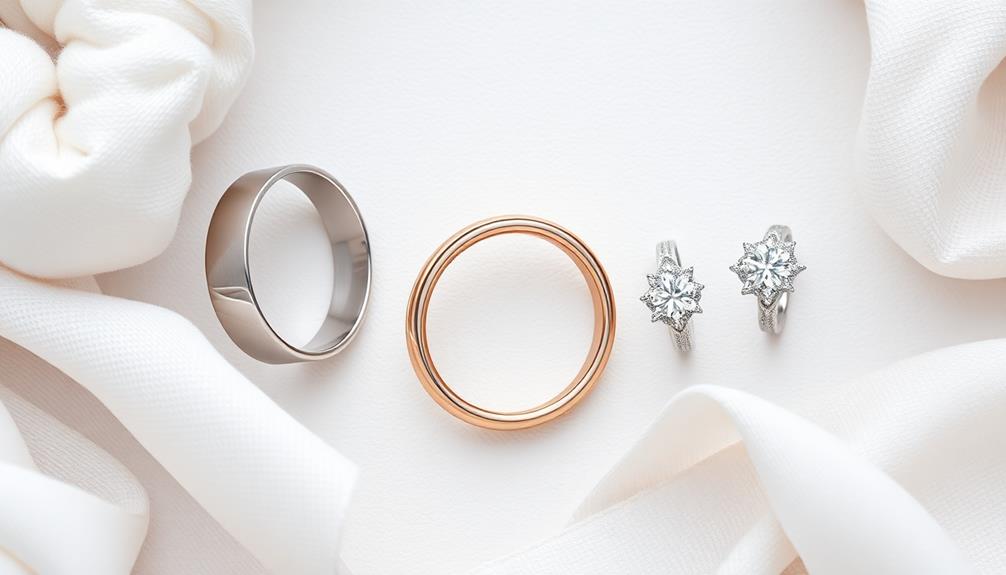
For those seeking hypoallergenic options, choosing the right materials is essential for comfort and style. Surgical steel is an excellent choice due to its low nickel content and durability, making it perfect for those with sensitive skin. Its chemical resistance also guarantees long-lasting wear without the risk of allergic reactions.
Another top contender is titanium. This lightweight metal is highly biocompatible and rarely causes any allergic reactions, making it a fantastic option for hypoallergenic jewelry.
If you prefer gold, remember that while 24k gold is considered hypoallergenic, lower karats like 14k and 18k may contain nickel, so always check the composition.
Niobium is another great material known for its hypoallergenic properties. This rare metal is often used in body jewelry and comes in various colors, allowing for stylish choices without sacrificing comfort.
Finally, rhodium-plated silver enhances hypoallergenic qualities by providing a protective barrier against allergens like nickel, making it suitable for sensitive skin.
Shopping Tips for Sensitive Skin

When shopping for jewelry suitable for sensitive skin, it's important to prioritize materials that minimize the risk of allergic reactions. To help you make safe choices, consider these shopping tips:
- Look for hypoallergenic labels: Confirm the jewelry is explicitly labeled as hypoallergenic or made from surgical steel to guarantee low nickel content, which can trigger allergic reactions.
- Avoid known allergens: Steer clear of jewelry containing nickel, brass, or gold-plated items, as these can lead to skin irritations and discomfort.
- Check metal composition: Always verify the metal composition by reviewing product descriptions and certifications. Remember, "hypoallergenic" can vary in meaning.
- Consult a dermatologist: If you have a history of skin sensitivities, seek personalized recommendations for safe jewelry options.
Also, explore jewelry options made from titanium, niobium, or 24k gold, as these materials are generally well-tolerated by sensitive skin.
Frequently Asked Questions
What Jewelry Is Best for Sensitive Skin?
When you're choosing jewelry for sensitive skin, opt for materials like titanium, surgical stainless steel, or pure gold. Always check for "nickel-free" labels to prevent irritation and guarantee your comfort throughout the day.
What Is the Best Material for Body Jewelry for Sensitive Skin?
Did you know nearly 15% of people experience metal allergies? When choosing body jewelry, opt for titanium or surgical stainless steel; they're lightweight, durable, and greatly reduce your risk of allergic reactions. You deserve comfort!
What Jewelry Should I Wear if I'm Allergic?
If you're allergic, choose jewelry made from titanium, surgical stainless steel, or high-karat gold. Always look for "nickel-free" labels, and consider organic materials like cotton for non-metal options to avoid irritation.
Is Titanium or Stainless Steel Better for Sensitive Skin?
When considering titanium or stainless steel, you'll find titanium generally outperforms. Its pure composition means fewer reactions, but don't dismiss stainless steel entirely; it might work for you if your sensitivities are mild.
Conclusion
In a world where beauty often clashes with comfort, hypoallergenic jewelry offers a seamless blend of both. You don't have to sacrifice style for the sake of your sensitive skin. By choosing the right materials, you can flaunt your favorite pieces without the worry of irritation. So, embrace the elegance of hypoallergenic options and enjoy the confidence that comes with wearing jewelry that loves your skin as much as you do.

